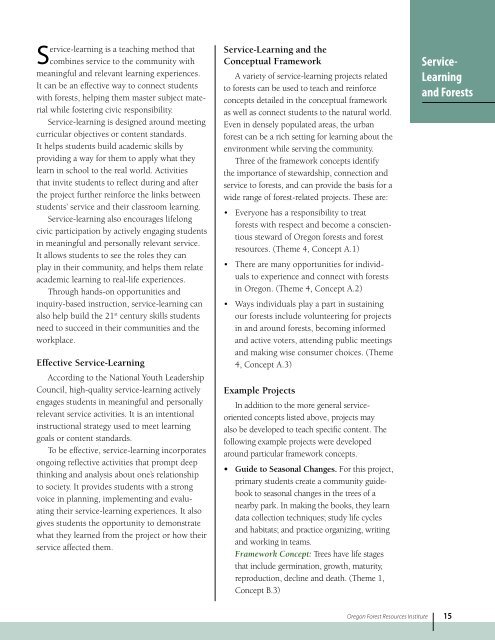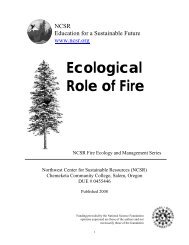Oregon Forest Literacy Program (PDF) - Learn Forests
Oregon Forest Literacy Program (PDF) - Learn Forests
Oregon Forest Literacy Program (PDF) - Learn Forests
Create successful ePaper yourself
Turn your PDF publications into a flip-book with our unique Google optimized e-Paper software.
Service-learning is a teaching method that<br />
combines service to the community with<br />
meaningful and relevant learning experiences.<br />
It can be an effective way to connect students<br />
with forests, helping them master subject material<br />
while fostering civic responsibility.<br />
Service-learning is designed around meeting<br />
curricular objectives or content standards.<br />
It helps students build academic skills by<br />
providing a way for them to apply what they<br />
learn in school to the real world. Activities<br />
that invite students to reflect during and after<br />
the project further reinforce the links between<br />
students’ service and their classroom learning.<br />
Service-learning also encourages lifelong<br />
civic participation by actively engaging students<br />
in meaningful and personally relevant service.<br />
It allows students to see the roles they can<br />
play in their community, and helps them relate<br />
academic learning to real-life experiences.<br />
Through hands-on opportunities and<br />
inquiry-based instruction, service-learning can<br />
also help build the 21 st century skills students<br />
need to succeed in their communities and the<br />
workplace.<br />
Effective Service-<strong>Learn</strong>ing<br />
According to the National Youth Leadership<br />
Council, high-quality service-learning actively<br />
engages students in meaningful and personally<br />
relevant service activities. It is an intentional<br />
instructional strategy used to meet learning<br />
goals or content standards.<br />
To be effective, service-learning incorporates<br />
ongoing reflective activities that prompt deep<br />
thinking and analysis about one’s relationship<br />
to society. It provides students with a strong<br />
voice in planning, implementing and evaluating<br />
their service-learning experiences. It also<br />
gives students the opportunity to demonstrate<br />
what they learned from the project or how their<br />
service affected them.<br />
Service-<strong>Learn</strong>ing and the<br />
Conceptual Framework<br />
A variety of service-learning projects related<br />
to forests can be used to teach and reinforce<br />
concepts detailed in the conceptual framework<br />
as well as connect students to the natural world.<br />
Even in densely populated areas, the urban<br />
forest can be a rich setting for learning about the<br />
environment while serving the community.<br />
Three of the framework concepts identify<br />
the importance of stewardship, connection and<br />
service to forests, and can provide the basis for a<br />
wide range of forest-related projects. These are:<br />
Everyone has a responsibility to treat<br />
forests with respect and become a conscientious<br />
steward of <strong>Oregon</strong> forests and forest<br />
resources. (Theme 4, Concept A.1)<br />
There are many opportunities for individuals<br />
to experience and connect with forests<br />
in <strong>Oregon</strong>. (Theme 4, Concept A.2)<br />
Ways individuals play a part in sustaining<br />
our forests include volunteering for projects<br />
in and around forests, becoming informed<br />
and active voters, attending public meetings<br />
and making wise consumer choices. (Theme<br />
4, Concept A.3)<br />
Example Projects<br />
In addition to the more general serviceoriented<br />
concepts listed above, projects may<br />
also be developed to teach specific content. The<br />
following example projects were developed<br />
around particular framework concepts.<br />
Guide to Seasonal Changes. For this project,<br />
primary students create a community guidebook<br />
to seasonal changes in the trees of a<br />
nearby park. In making the books, they learn<br />
data collection techniques; study life cycles<br />
and habitats; and practice organizing, writing<br />
and working in teams.<br />
Framework Concept: Trees have life stages<br />
that include germination, growth, maturity,<br />
reproduction, decline and death. (Theme 1,<br />
Concept B.3)<br />
Service-<br />
<strong>Learn</strong>ing<br />
and <strong>Forest</strong>s<br />
<strong>Oregon</strong> <strong>Forest</strong> Resources Institute<br />
15



